An Analysis of Globalization's Impact on International Development
VerifiedAdded on 2020/06/03
|14
|4823
|212
Essay
AI Summary
This essay provides a comprehensive analysis of the multifaceted effects of globalization on international development. It delves into the positive impacts, such as technological advancements, increased trade, and improved living standards, while also examining the negative consequences, including increased competition for small businesses, widening income inequality, and potential exploitation of developing nations. The essay explores how globalization has influenced international political economy, trade liberalization, and the interconnectedness of global markets. It also discusses the roles of international organizations like the IMF, World Bank, and WTO in shaping these dynamics, offering a balanced perspective on the benefits and challenges of globalization for both developed and developing countries.
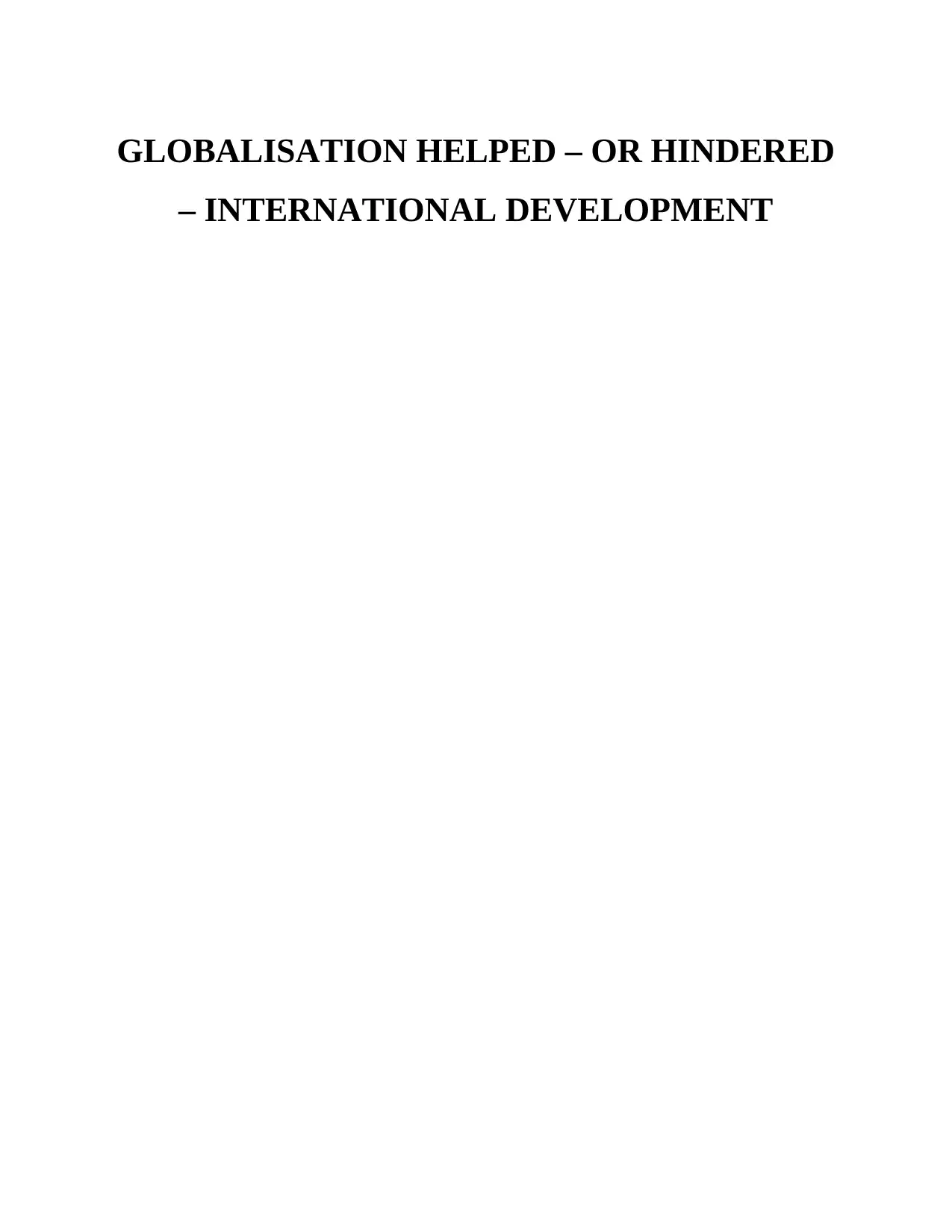
GLOBALISATION HELPED – OR HINDERED
– INTERNATIONAL DEVELOPMENT
– INTERNATIONAL DEVELOPMENT
Paraphrase This Document
Need a fresh take? Get an instant paraphrase of this document with our AI Paraphraser
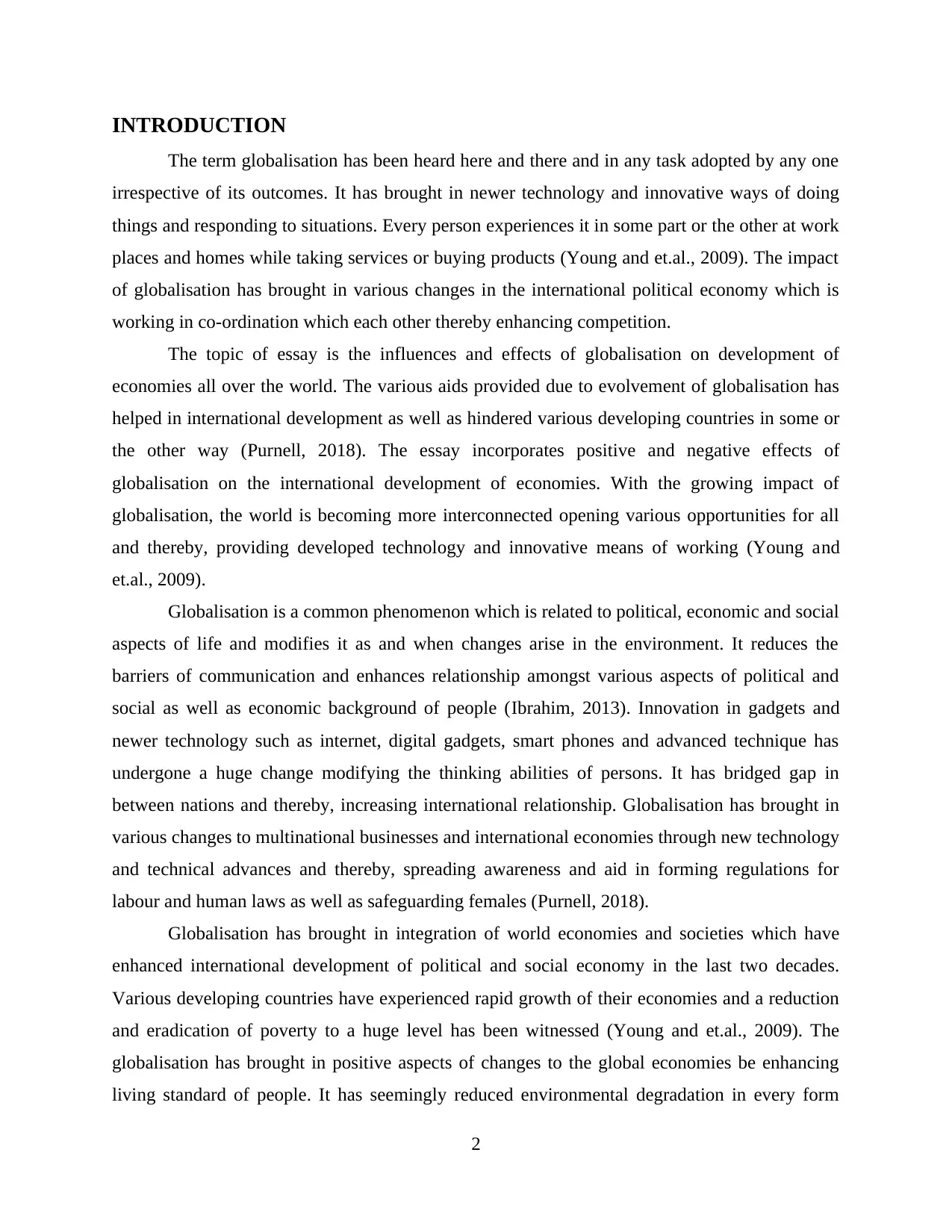
INTRODUCTION
The term globalisation has been heard here and there and in any task adopted by any one
irrespective of its outcomes. It has brought in newer technology and innovative ways of doing
things and responding to situations. Every person experiences it in some part or the other at work
places and homes while taking services or buying products (Young and et.al., 2009). The impact
of globalisation has brought in various changes in the international political economy which is
working in co-ordination which each other thereby enhancing competition.
The topic of essay is the influences and effects of globalisation on development of
economies all over the world. The various aids provided due to evolvement of globalisation has
helped in international development as well as hindered various developing countries in some or
the other way (Purnell, 2018). The essay incorporates positive and negative effects of
globalisation on the international development of economies. With the growing impact of
globalisation, the world is becoming more interconnected opening various opportunities for all
and thereby, providing developed technology and innovative means of working (Young and
et.al., 2009).
Globalisation is a common phenomenon which is related to political, economic and social
aspects of life and modifies it as and when changes arise in the environment. It reduces the
barriers of communication and enhances relationship amongst various aspects of political and
social as well as economic background of people (Ibrahim, 2013). Innovation in gadgets and
newer technology such as internet, digital gadgets, smart phones and advanced technique has
undergone a huge change modifying the thinking abilities of persons. It has bridged gap in
between nations and thereby, increasing international relationship. Globalisation has brought in
various changes to multinational businesses and international economies through new technology
and technical advances and thereby, spreading awareness and aid in forming regulations for
labour and human laws as well as safeguarding females (Purnell, 2018).
Globalisation has brought in integration of world economies and societies which have
enhanced international development of political and social economy in the last two decades.
Various developing countries have experienced rapid growth of their economies and a reduction
and eradication of poverty to a huge level has been witnessed (Young and et.al., 2009). The
globalisation has brought in positive aspects of changes to the global economies be enhancing
living standard of people. It has seemingly reduced environmental degradation in every form
2
The term globalisation has been heard here and there and in any task adopted by any one
irrespective of its outcomes. It has brought in newer technology and innovative ways of doing
things and responding to situations. Every person experiences it in some part or the other at work
places and homes while taking services or buying products (Young and et.al., 2009). The impact
of globalisation has brought in various changes in the international political economy which is
working in co-ordination which each other thereby enhancing competition.
The topic of essay is the influences and effects of globalisation on development of
economies all over the world. The various aids provided due to evolvement of globalisation has
helped in international development as well as hindered various developing countries in some or
the other way (Purnell, 2018). The essay incorporates positive and negative effects of
globalisation on the international development of economies. With the growing impact of
globalisation, the world is becoming more interconnected opening various opportunities for all
and thereby, providing developed technology and innovative means of working (Young and
et.al., 2009).
Globalisation is a common phenomenon which is related to political, economic and social
aspects of life and modifies it as and when changes arise in the environment. It reduces the
barriers of communication and enhances relationship amongst various aspects of political and
social as well as economic background of people (Ibrahim, 2013). Innovation in gadgets and
newer technology such as internet, digital gadgets, smart phones and advanced technique has
undergone a huge change modifying the thinking abilities of persons. It has bridged gap in
between nations and thereby, increasing international relationship. Globalisation has brought in
various changes to multinational businesses and international economies through new technology
and technical advances and thereby, spreading awareness and aid in forming regulations for
labour and human laws as well as safeguarding females (Purnell, 2018).
Globalisation has brought in integration of world economies and societies which have
enhanced international development of political and social economy in the last two decades.
Various developing countries have experienced rapid growth of their economies and a reduction
and eradication of poverty to a huge level has been witnessed (Young and et.al., 2009). The
globalisation has brought in positive aspects of changes to the global economies be enhancing
living standard of people. It has seemingly reduced environmental degradation in every form
2
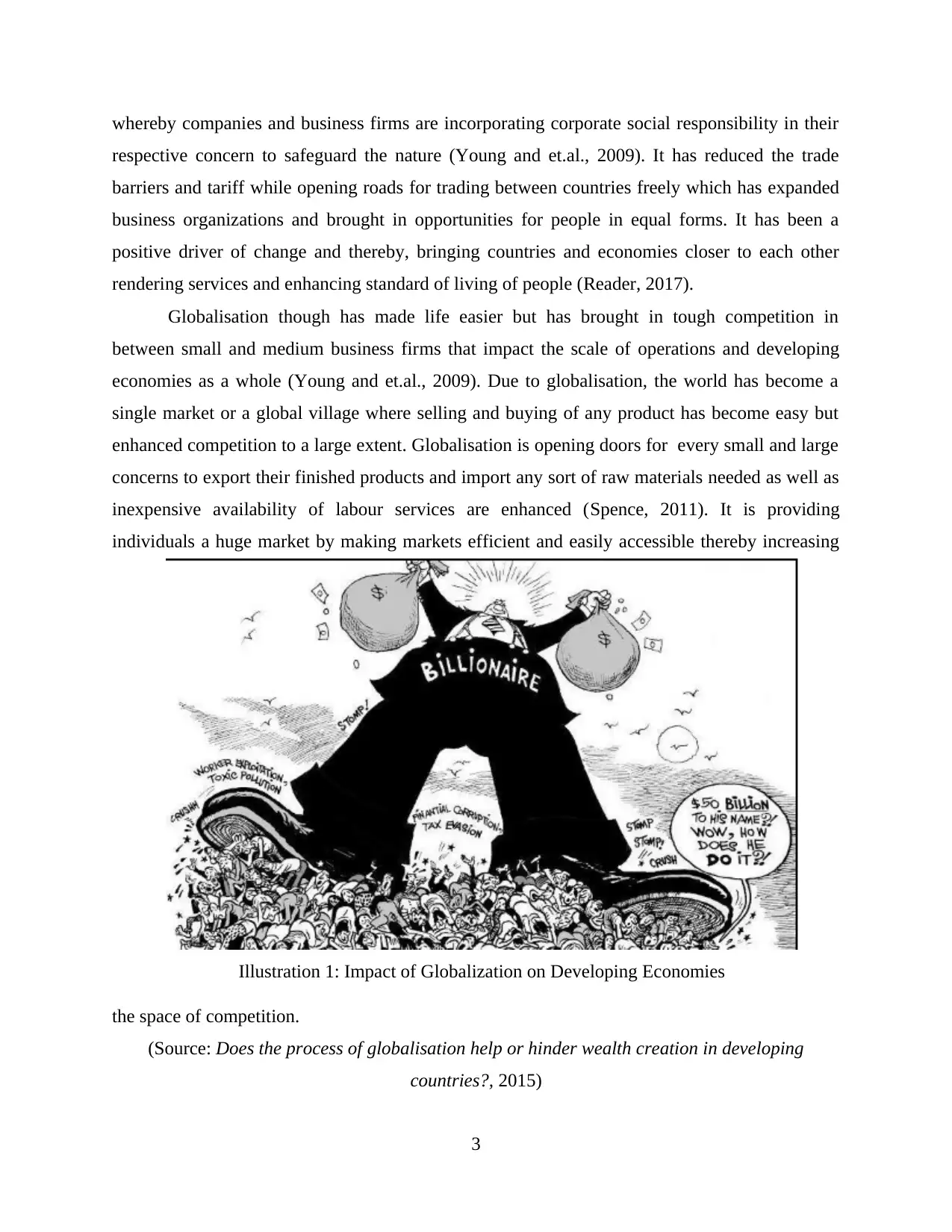
whereby companies and business firms are incorporating corporate social responsibility in their
respective concern to safeguard the nature (Young and et.al., 2009). It has reduced the trade
barriers and tariff while opening roads for trading between countries freely which has expanded
business organizations and brought in opportunities for people in equal forms. It has been a
positive driver of change and thereby, bringing countries and economies closer to each other
rendering services and enhancing standard of living of people (Reader, 2017).
Globalisation though has made life easier but has brought in tough competition in
between small and medium business firms that impact the scale of operations and developing
economies as a whole (Young and et.al., 2009). Due to globalisation, the world has become a
single market or a global village where selling and buying of any product has become easy but
enhanced competition to a large extent. Globalisation is opening doors for every small and large
concerns to export their finished products and import any sort of raw materials needed as well as
inexpensive availability of labour services are enhanced (Spence, 2011). It is providing
individuals a huge market by making markets efficient and easily accessible thereby increasing
the space of competition.
(Source: Does the process of globalisation help or hinder wealth creation in developing
countries?, 2015)
3
Illustration 1: Impact of Globalization on Developing Economies
respective concern to safeguard the nature (Young and et.al., 2009). It has reduced the trade
barriers and tariff while opening roads for trading between countries freely which has expanded
business organizations and brought in opportunities for people in equal forms. It has been a
positive driver of change and thereby, bringing countries and economies closer to each other
rendering services and enhancing standard of living of people (Reader, 2017).
Globalisation though has made life easier but has brought in tough competition in
between small and medium business firms that impact the scale of operations and developing
economies as a whole (Young and et.al., 2009). Due to globalisation, the world has become a
single market or a global village where selling and buying of any product has become easy but
enhanced competition to a large extent. Globalisation is opening doors for every small and large
concerns to export their finished products and import any sort of raw materials needed as well as
inexpensive availability of labour services are enhanced (Spence, 2011). It is providing
individuals a huge market by making markets efficient and easily accessible thereby increasing
the space of competition.
(Source: Does the process of globalisation help or hinder wealth creation in developing
countries?, 2015)
3
Illustration 1: Impact of Globalization on Developing Economies
⊘ This is a preview!⊘
Do you want full access?
Subscribe today to unlock all pages.

Trusted by 1+ million students worldwide
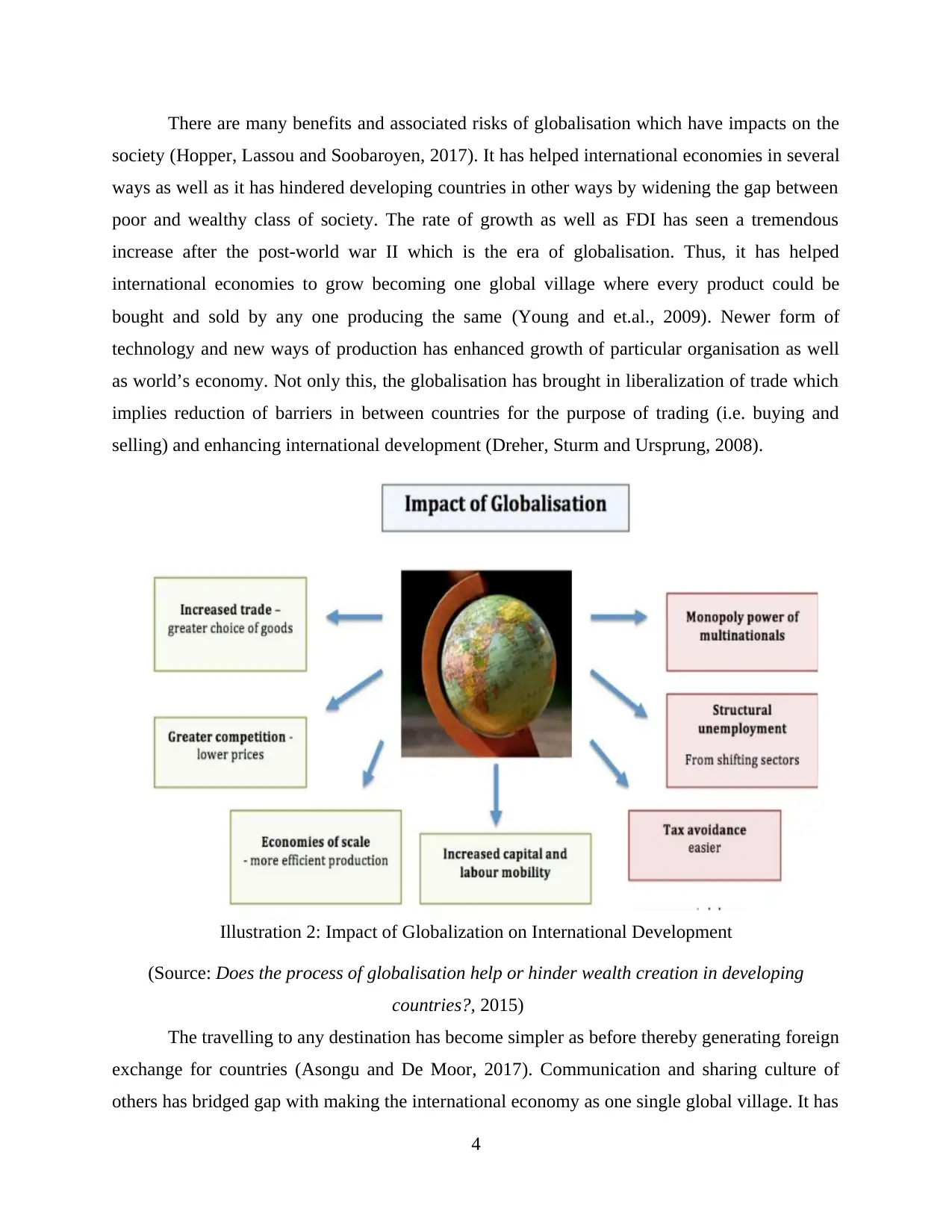
There are many benefits and associated risks of globalisation which have impacts on the
society (Hopper, Lassou and Soobaroyen, 2017). It has helped international economies in several
ways as well as it has hindered developing countries in other ways by widening the gap between
poor and wealthy class of society. The rate of growth as well as FDI has seen a tremendous
increase after the post-world war II which is the era of globalisation. Thus, it has helped
international economies to grow becoming one global village where every product could be
bought and sold by any one producing the same (Young and et.al., 2009). Newer form of
technology and new ways of production has enhanced growth of particular organisation as well
as world’s economy. Not only this, the globalisation has brought in liberalization of trade which
implies reduction of barriers in between countries for the purpose of trading (i.e. buying and
selling) and enhancing international development (Dreher, Sturm and Ursprung, 2008).
(Source: Does the process of globalisation help or hinder wealth creation in developing
countries?, 2015)
The travelling to any destination has become simpler as before thereby generating foreign
exchange for countries (Asongu and De Moor, 2017). Communication and sharing culture of
others has bridged gap with making the international economy as one single global village. It has
4
Illustration 2: Impact of Globalization on International Development
society (Hopper, Lassou and Soobaroyen, 2017). It has helped international economies in several
ways as well as it has hindered developing countries in other ways by widening the gap between
poor and wealthy class of society. The rate of growth as well as FDI has seen a tremendous
increase after the post-world war II which is the era of globalisation. Thus, it has helped
international economies to grow becoming one global village where every product could be
bought and sold by any one producing the same (Young and et.al., 2009). Newer form of
technology and new ways of production has enhanced growth of particular organisation as well
as world’s economy. Not only this, the globalisation has brought in liberalization of trade which
implies reduction of barriers in between countries for the purpose of trading (i.e. buying and
selling) and enhancing international development (Dreher, Sturm and Ursprung, 2008).
(Source: Does the process of globalisation help or hinder wealth creation in developing
countries?, 2015)
The travelling to any destination has become simpler as before thereby generating foreign
exchange for countries (Asongu and De Moor, 2017). Communication and sharing culture of
others has bridged gap with making the international economy as one single global village. It has
4
Illustration 2: Impact of Globalization on International Development
Paraphrase This Document
Need a fresh take? Get an instant paraphrase of this document with our AI Paraphraser
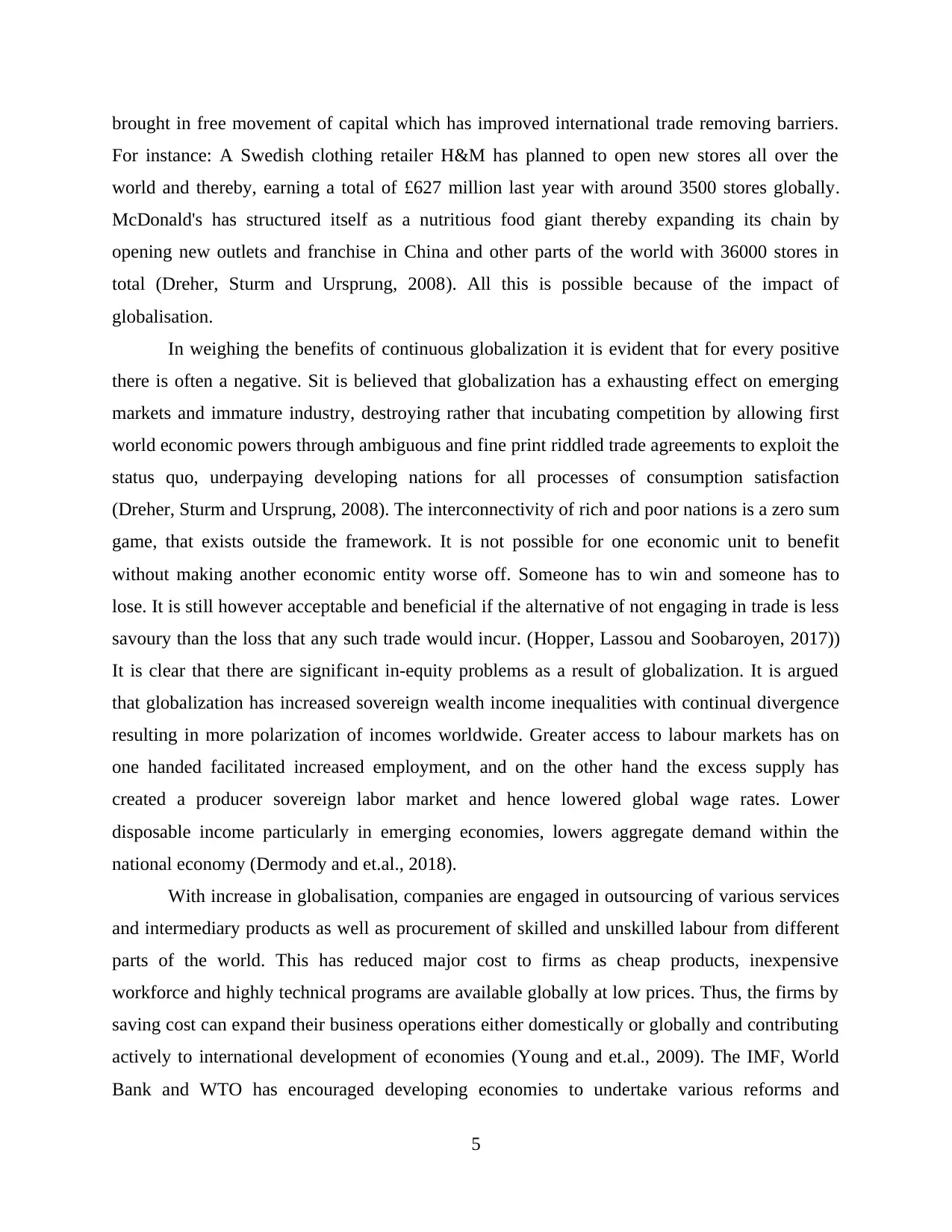
brought in free movement of capital which has improved international trade removing barriers.
For instance: A Swedish clothing retailer H&M has planned to open new stores all over the
world and thereby, earning a total of £627 million last year with around 3500 stores globally.
McDonald's has structured itself as a nutritious food giant thereby expanding its chain by
opening new outlets and franchise in China and other parts of the world with 36000 stores in
total (Dreher, Sturm and Ursprung, 2008). All this is possible because of the impact of
globalisation.
In weighing the benefits of continuous globalization it is evident that for every positive
there is often a negative. Sit is believed that globalization has a exhausting effect on emerging
markets and immature industry, destroying rather that incubating competition by allowing first
world economic powers through ambiguous and fine print riddled trade agreements to exploit the
status quo, underpaying developing nations for all processes of consumption satisfaction
(Dreher, Sturm and Ursprung, 2008). The interconnectivity of rich and poor nations is a zero sum
game, that exists outside the framework. It is not possible for one economic unit to benefit
without making another economic entity worse off. Someone has to win and someone has to
lose. It is still however acceptable and beneficial if the alternative of not engaging in trade is less
savoury than the loss that any such trade would incur. (Hopper, Lassou and Soobaroyen, 2017))
It is clear that there are significant in-equity problems as a result of globalization. It is argued
that globalization has increased sovereign wealth income inequalities with continual divergence
resulting in more polarization of incomes worldwide. Greater access to labour markets has on
one handed facilitated increased employment, and on the other hand the excess supply has
created a producer sovereign labor market and hence lowered global wage rates. Lower
disposable income particularly in emerging economies, lowers aggregate demand within the
national economy (Dermody and et.al., 2018).
With increase in globalisation, companies are engaged in outsourcing of various services
and intermediary products as well as procurement of skilled and unskilled labour from different
parts of the world. This has reduced major cost to firms as cheap products, inexpensive
workforce and highly technical programs are available globally at low prices. Thus, the firms by
saving cost can expand their business operations either domestically or globally and contributing
actively to international development of economies (Young and et.al., 2009). The IMF, World
Bank and WTO has encouraged developing economies to undertake various reforms and
5
For instance: A Swedish clothing retailer H&M has planned to open new stores all over the
world and thereby, earning a total of £627 million last year with around 3500 stores globally.
McDonald's has structured itself as a nutritious food giant thereby expanding its chain by
opening new outlets and franchise in China and other parts of the world with 36000 stores in
total (Dreher, Sturm and Ursprung, 2008). All this is possible because of the impact of
globalisation.
In weighing the benefits of continuous globalization it is evident that for every positive
there is often a negative. Sit is believed that globalization has a exhausting effect on emerging
markets and immature industry, destroying rather that incubating competition by allowing first
world economic powers through ambiguous and fine print riddled trade agreements to exploit the
status quo, underpaying developing nations for all processes of consumption satisfaction
(Dreher, Sturm and Ursprung, 2008). The interconnectivity of rich and poor nations is a zero sum
game, that exists outside the framework. It is not possible for one economic unit to benefit
without making another economic entity worse off. Someone has to win and someone has to
lose. It is still however acceptable and beneficial if the alternative of not engaging in trade is less
savoury than the loss that any such trade would incur. (Hopper, Lassou and Soobaroyen, 2017))
It is clear that there are significant in-equity problems as a result of globalization. It is argued
that globalization has increased sovereign wealth income inequalities with continual divergence
resulting in more polarization of incomes worldwide. Greater access to labour markets has on
one handed facilitated increased employment, and on the other hand the excess supply has
created a producer sovereign labor market and hence lowered global wage rates. Lower
disposable income particularly in emerging economies, lowers aggregate demand within the
national economy (Dermody and et.al., 2018).
With increase in globalisation, companies are engaged in outsourcing of various services
and intermediary products as well as procurement of skilled and unskilled labour from different
parts of the world. This has reduced major cost to firms as cheap products, inexpensive
workforce and highly technical programs are available globally at low prices. Thus, the firms by
saving cost can expand their business operations either domestically or globally and contributing
actively to international development of economies (Young and et.al., 2009). The IMF, World
Bank and WTO has encouraged developing economies to undertake various reforms and
5
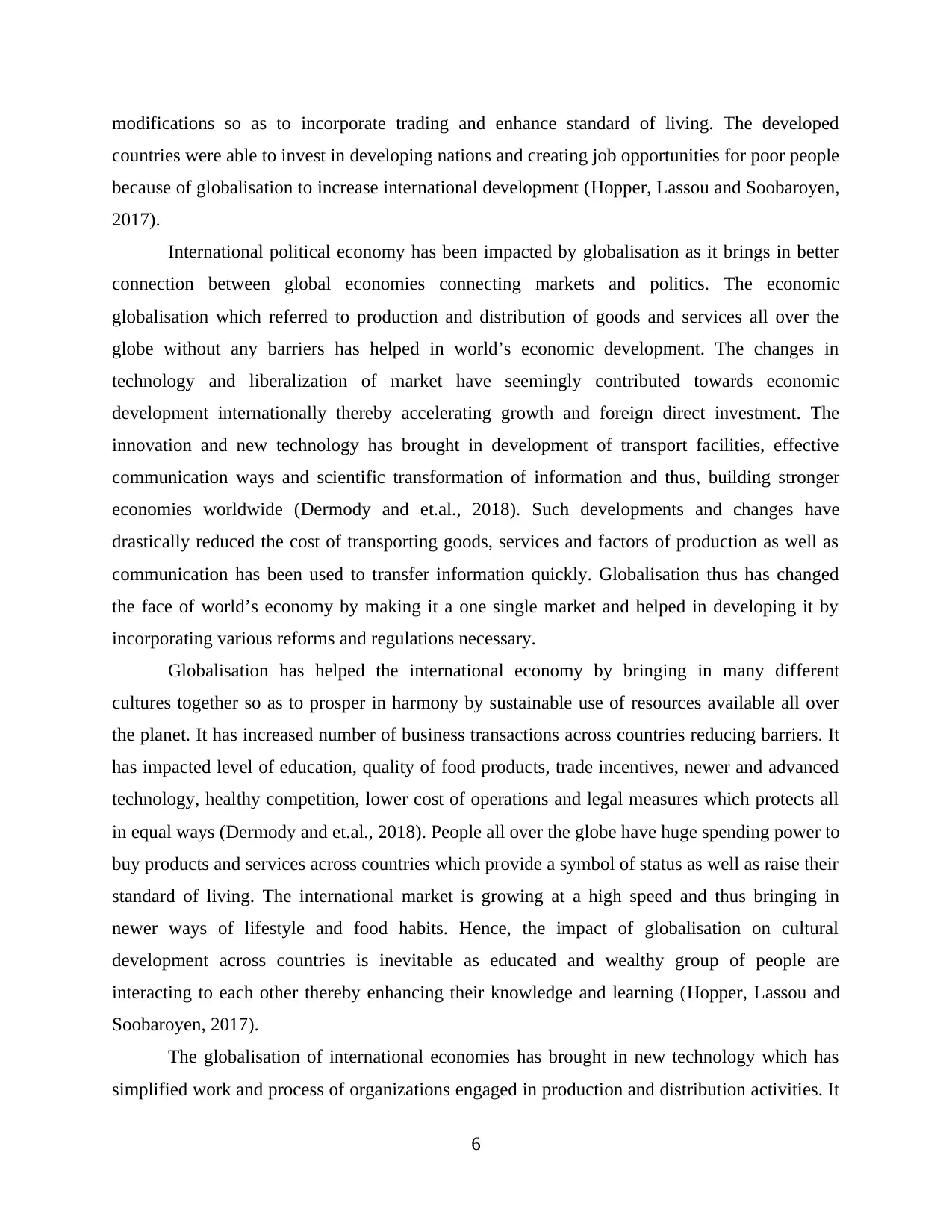
modifications so as to incorporate trading and enhance standard of living. The developed
countries were able to invest in developing nations and creating job opportunities for poor people
because of globalisation to increase international development (Hopper, Lassou and Soobaroyen,
2017).
International political economy has been impacted by globalisation as it brings in better
connection between global economies connecting markets and politics. The economic
globalisation which referred to production and distribution of goods and services all over the
globe without any barriers has helped in world’s economic development. The changes in
technology and liberalization of market have seemingly contributed towards economic
development internationally thereby accelerating growth and foreign direct investment. The
innovation and new technology has brought in development of transport facilities, effective
communication ways and scientific transformation of information and thus, building stronger
economies worldwide (Dermody and et.al., 2018). Such developments and changes have
drastically reduced the cost of transporting goods, services and factors of production as well as
communication has been used to transfer information quickly. Globalisation thus has changed
the face of world’s economy by making it a one single market and helped in developing it by
incorporating various reforms and regulations necessary.
Globalisation has helped the international economy by bringing in many different
cultures together so as to prosper in harmony by sustainable use of resources available all over
the planet. It has increased number of business transactions across countries reducing barriers. It
has impacted level of education, quality of food products, trade incentives, newer and advanced
technology, healthy competition, lower cost of operations and legal measures which protects all
in equal ways (Dermody and et.al., 2018). People all over the globe have huge spending power to
buy products and services across countries which provide a symbol of status as well as raise their
standard of living. The international market is growing at a high speed and thus bringing in
newer ways of lifestyle and food habits. Hence, the impact of globalisation on cultural
development across countries is inevitable as educated and wealthy group of people are
interacting to each other thereby enhancing their knowledge and learning (Hopper, Lassou and
Soobaroyen, 2017).
The globalisation of international economies has brought in new technology which has
simplified work and process of organizations engaged in production and distribution activities. It
6
countries were able to invest in developing nations and creating job opportunities for poor people
because of globalisation to increase international development (Hopper, Lassou and Soobaroyen,
2017).
International political economy has been impacted by globalisation as it brings in better
connection between global economies connecting markets and politics. The economic
globalisation which referred to production and distribution of goods and services all over the
globe without any barriers has helped in world’s economic development. The changes in
technology and liberalization of market have seemingly contributed towards economic
development internationally thereby accelerating growth and foreign direct investment. The
innovation and new technology has brought in development of transport facilities, effective
communication ways and scientific transformation of information and thus, building stronger
economies worldwide (Dermody and et.al., 2018). Such developments and changes have
drastically reduced the cost of transporting goods, services and factors of production as well as
communication has been used to transfer information quickly. Globalisation thus has changed
the face of world’s economy by making it a one single market and helped in developing it by
incorporating various reforms and regulations necessary.
Globalisation has helped the international economy by bringing in many different
cultures together so as to prosper in harmony by sustainable use of resources available all over
the planet. It has increased number of business transactions across countries reducing barriers. It
has impacted level of education, quality of food products, trade incentives, newer and advanced
technology, healthy competition, lower cost of operations and legal measures which protects all
in equal ways (Dermody and et.al., 2018). People all over the globe have huge spending power to
buy products and services across countries which provide a symbol of status as well as raise their
standard of living. The international market is growing at a high speed and thus bringing in
newer ways of lifestyle and food habits. Hence, the impact of globalisation on cultural
development across countries is inevitable as educated and wealthy group of people are
interacting to each other thereby enhancing their knowledge and learning (Hopper, Lassou and
Soobaroyen, 2017).
The globalisation of international economies has brought in new technology which has
simplified work and process of organizations engaged in production and distribution activities. It
6
⊘ This is a preview!⊘
Do you want full access?
Subscribe today to unlock all pages.

Trusted by 1+ million students worldwide
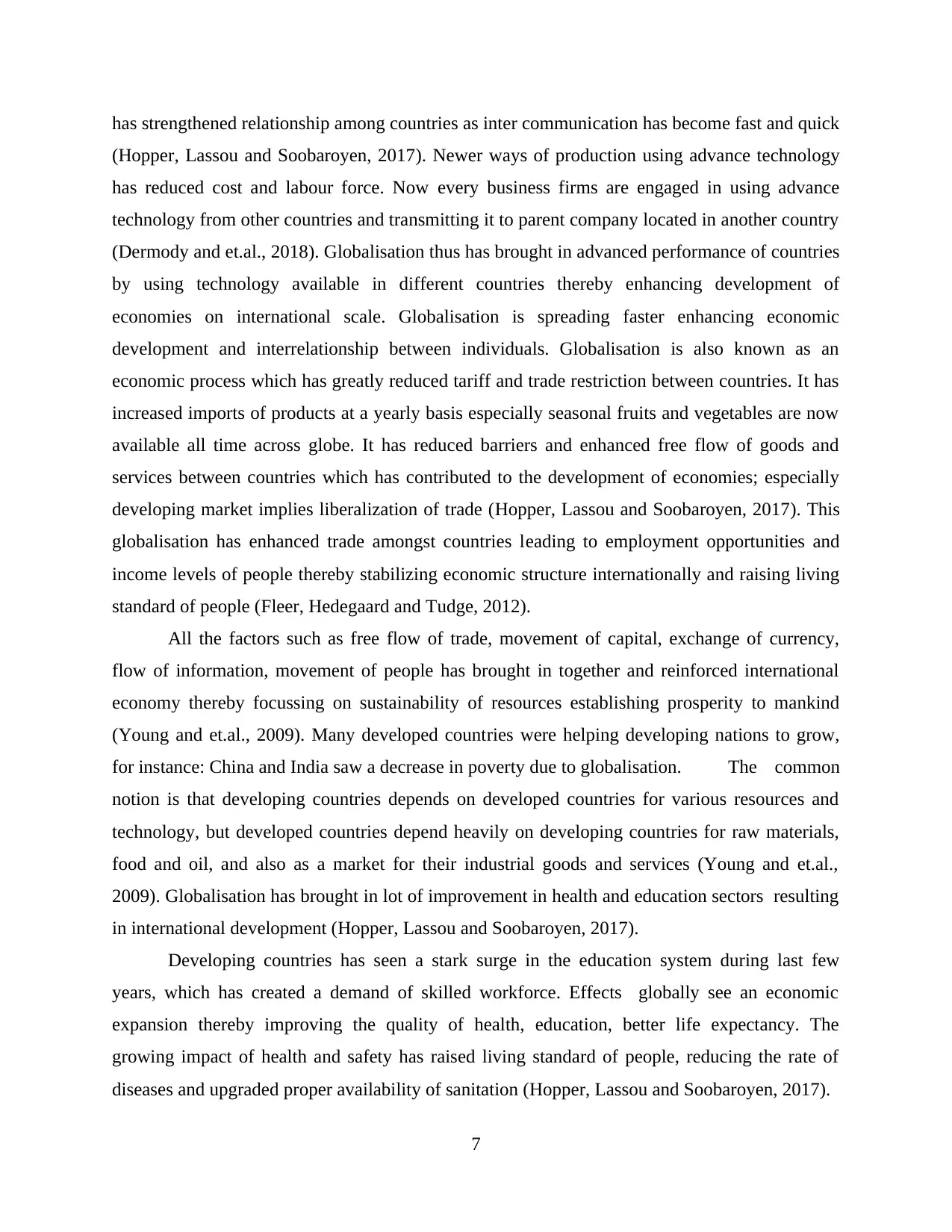
has strengthened relationship among countries as inter communication has become fast and quick
(Hopper, Lassou and Soobaroyen, 2017). Newer ways of production using advance technology
has reduced cost and labour force. Now every business firms are engaged in using advance
technology from other countries and transmitting it to parent company located in another country
(Dermody and et.al., 2018). Globalisation thus has brought in advanced performance of countries
by using technology available in different countries thereby enhancing development of
economies on international scale. Globalisation is spreading faster enhancing economic
development and interrelationship between individuals. Globalisation is also known as an
economic process which has greatly reduced tariff and trade restriction between countries. It has
increased imports of products at a yearly basis especially seasonal fruits and vegetables are now
available all time across globe. It has reduced barriers and enhanced free flow of goods and
services between countries which has contributed to the development of economies; especially
developing market implies liberalization of trade (Hopper, Lassou and Soobaroyen, 2017). This
globalisation has enhanced trade amongst countries leading to employment opportunities and
income levels of people thereby stabilizing economic structure internationally and raising living
standard of people (Fleer, Hedegaard and Tudge, 2012).
All the factors such as free flow of trade, movement of capital, exchange of currency,
flow of information, movement of people has brought in together and reinforced international
economy thereby focussing on sustainability of resources establishing prosperity to mankind
(Young and et.al., 2009). Many developed countries were helping developing nations to grow,
for instance: China and India saw a decrease in poverty due to globalisation. The common
notion is that developing countries depends on developed countries for various resources and
technology, but developed countries depend heavily on developing countries for raw materials,
food and oil, and also as a market for their industrial goods and services (Young and et.al.,
2009). Globalisation has brought in lot of improvement in health and education sectors resulting
in international development (Hopper, Lassou and Soobaroyen, 2017).
Developing countries has seen a stark surge in the education system during last few
years, which has created a demand of skilled workforce. Effects globally see an economic
expansion thereby improving the quality of health, education, better life expectancy. The
growing impact of health and safety has raised living standard of people, reducing the rate of
diseases and upgraded proper availability of sanitation (Hopper, Lassou and Soobaroyen, 2017).
7
(Hopper, Lassou and Soobaroyen, 2017). Newer ways of production using advance technology
has reduced cost and labour force. Now every business firms are engaged in using advance
technology from other countries and transmitting it to parent company located in another country
(Dermody and et.al., 2018). Globalisation thus has brought in advanced performance of countries
by using technology available in different countries thereby enhancing development of
economies on international scale. Globalisation is spreading faster enhancing economic
development and interrelationship between individuals. Globalisation is also known as an
economic process which has greatly reduced tariff and trade restriction between countries. It has
increased imports of products at a yearly basis especially seasonal fruits and vegetables are now
available all time across globe. It has reduced barriers and enhanced free flow of goods and
services between countries which has contributed to the development of economies; especially
developing market implies liberalization of trade (Hopper, Lassou and Soobaroyen, 2017). This
globalisation has enhanced trade amongst countries leading to employment opportunities and
income levels of people thereby stabilizing economic structure internationally and raising living
standard of people (Fleer, Hedegaard and Tudge, 2012).
All the factors such as free flow of trade, movement of capital, exchange of currency,
flow of information, movement of people has brought in together and reinforced international
economy thereby focussing on sustainability of resources establishing prosperity to mankind
(Young and et.al., 2009). Many developed countries were helping developing nations to grow,
for instance: China and India saw a decrease in poverty due to globalisation. The common
notion is that developing countries depends on developed countries for various resources and
technology, but developed countries depend heavily on developing countries for raw materials,
food and oil, and also as a market for their industrial goods and services (Young and et.al.,
2009). Globalisation has brought in lot of improvement in health and education sectors resulting
in international development (Hopper, Lassou and Soobaroyen, 2017).
Developing countries has seen a stark surge in the education system during last few
years, which has created a demand of skilled workforce. Effects globally see an economic
expansion thereby improving the quality of health, education, better life expectancy. The
growing impact of health and safety has raised living standard of people, reducing the rate of
diseases and upgraded proper availability of sanitation (Hopper, Lassou and Soobaroyen, 2017).
7
Paraphrase This Document
Need a fresh take? Get an instant paraphrase of this document with our AI Paraphraser
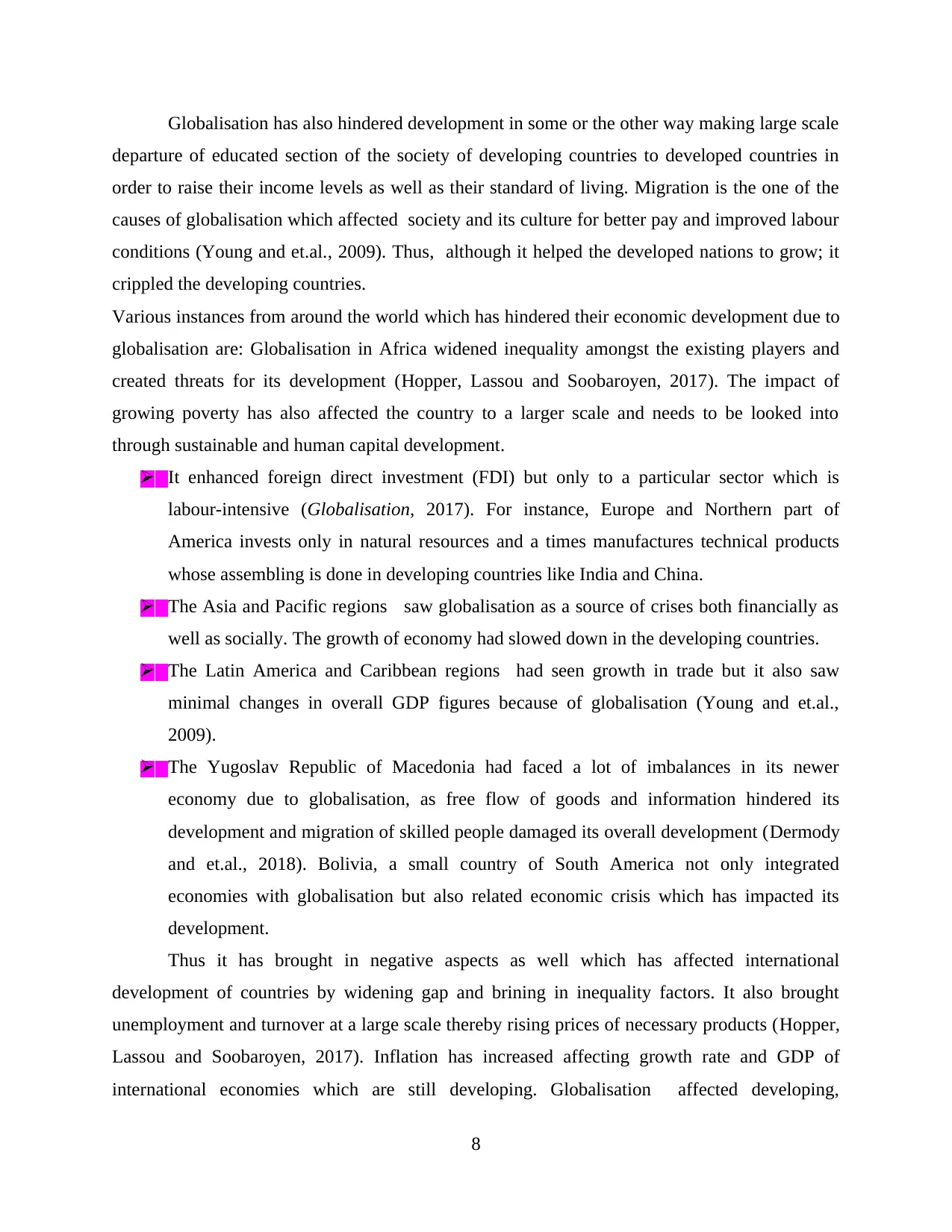
Globalisation has also hindered development in some or the other way making large scale
departure of educated section of the society of developing countries to developed countries in
order to raise their income levels as well as their standard of living. Migration is the one of the
causes of globalisation which affected society and its culture for better pay and improved labour
conditions (Young and et.al., 2009). Thus, although it helped the developed nations to grow; it
crippled the developing countries.
Various instances from around the world which has hindered their economic development due to
globalisation are: Globalisation in Africa widened inequality amongst the existing players and
created threats for its development (Hopper, Lassou and Soobaroyen, 2017). The impact of
growing poverty has also affected the country to a larger scale and needs to be looked into
through sustainable and human capital development.
It enhanced foreign direct investment (FDI) but only to a particular sector which is
labour-intensive (Globalisation, 2017). For instance, Europe and Northern part of
America invests only in natural resources and a times manufactures technical products
whose assembling is done in developing countries like India and China.
The Asia and Pacific regions saw globalisation as a source of crises both financially as
well as socially. The growth of economy had slowed down in the developing countries.
The Latin America and Caribbean regions had seen growth in trade but it also saw
minimal changes in overall GDP figures because of globalisation (Young and et.al.,
2009).
The Yugoslav Republic of Macedonia had faced a lot of imbalances in its newer
economy due to globalisation, as free flow of goods and information hindered its
development and migration of skilled people damaged its overall development (Dermody
and et.al., 2018). Bolivia, a small country of South America not only integrated
economies with globalisation but also related economic crisis which has impacted its
development.
Thus it has brought in negative aspects as well which has affected international
development of countries by widening gap and brining in inequality factors. It also brought
unemployment and turnover at a large scale thereby rising prices of necessary products (Hopper,
Lassou and Soobaroyen, 2017). Inflation has increased affecting growth rate and GDP of
international economies which are still developing. Globalisation affected developing,
8
departure of educated section of the society of developing countries to developed countries in
order to raise their income levels as well as their standard of living. Migration is the one of the
causes of globalisation which affected society and its culture for better pay and improved labour
conditions (Young and et.al., 2009). Thus, although it helped the developed nations to grow; it
crippled the developing countries.
Various instances from around the world which has hindered their economic development due to
globalisation are: Globalisation in Africa widened inequality amongst the existing players and
created threats for its development (Hopper, Lassou and Soobaroyen, 2017). The impact of
growing poverty has also affected the country to a larger scale and needs to be looked into
through sustainable and human capital development.
It enhanced foreign direct investment (FDI) but only to a particular sector which is
labour-intensive (Globalisation, 2017). For instance, Europe and Northern part of
America invests only in natural resources and a times manufactures technical products
whose assembling is done in developing countries like India and China.
The Asia and Pacific regions saw globalisation as a source of crises both financially as
well as socially. The growth of economy had slowed down in the developing countries.
The Latin America and Caribbean regions had seen growth in trade but it also saw
minimal changes in overall GDP figures because of globalisation (Young and et.al.,
2009).
The Yugoslav Republic of Macedonia had faced a lot of imbalances in its newer
economy due to globalisation, as free flow of goods and information hindered its
development and migration of skilled people damaged its overall development (Dermody
and et.al., 2018). Bolivia, a small country of South America not only integrated
economies with globalisation but also related economic crisis which has impacted its
development.
Thus it has brought in negative aspects as well which has affected international
development of countries by widening gap and brining in inequality factors. It also brought
unemployment and turnover at a large scale thereby rising prices of necessary products (Hopper,
Lassou and Soobaroyen, 2017). Inflation has increased affecting growth rate and GDP of
international economies which are still developing. Globalisation affected developing,
8
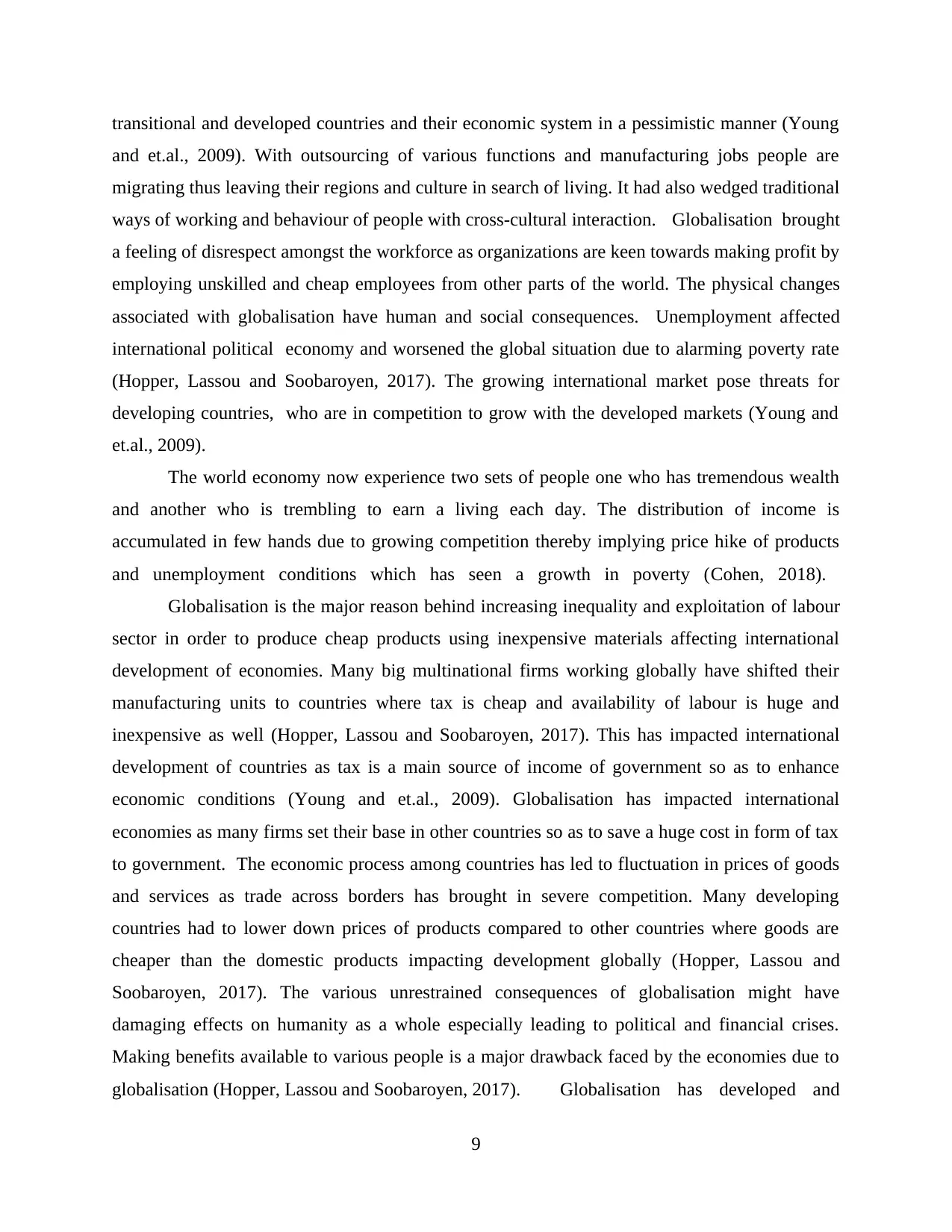
transitional and developed countries and their economic system in a pessimistic manner (Young
and et.al., 2009). With outsourcing of various functions and manufacturing jobs people are
migrating thus leaving their regions and culture in search of living. It had also wedged traditional
ways of working and behaviour of people with cross-cultural interaction. Globalisation brought
a feeling of disrespect amongst the workforce as organizations are keen towards making profit by
employing unskilled and cheap employees from other parts of the world. The physical changes
associated with globalisation have human and social consequences. Unemployment affected
international political economy and worsened the global situation due to alarming poverty rate
(Hopper, Lassou and Soobaroyen, 2017). The growing international market pose threats for
developing countries, who are in competition to grow with the developed markets (Young and
et.al., 2009).
The world economy now experience two sets of people one who has tremendous wealth
and another who is trembling to earn a living each day. The distribution of income is
accumulated in few hands due to growing competition thereby implying price hike of products
and unemployment conditions which has seen a growth in poverty (Cohen, 2018).
Globalisation is the major reason behind increasing inequality and exploitation of labour
sector in order to produce cheap products using inexpensive materials affecting international
development of economies. Many big multinational firms working globally have shifted their
manufacturing units to countries where tax is cheap and availability of labour is huge and
inexpensive as well (Hopper, Lassou and Soobaroyen, 2017). This has impacted international
development of countries as tax is a main source of income of government so as to enhance
economic conditions (Young and et.al., 2009). Globalisation has impacted international
economies as many firms set their base in other countries so as to save a huge cost in form of tax
to government. The economic process among countries has led to fluctuation in prices of goods
and services as trade across borders has brought in severe competition. Many developing
countries had to lower down prices of products compared to other countries where goods are
cheaper than the domestic products impacting development globally (Hopper, Lassou and
Soobaroyen, 2017). The various unrestrained consequences of globalisation might have
damaging effects on humanity as a whole especially leading to political and financial crises.
Making benefits available to various people is a major drawback faced by the economies due to
globalisation (Hopper, Lassou and Soobaroyen, 2017). Globalisation has developed and
9
and et.al., 2009). With outsourcing of various functions and manufacturing jobs people are
migrating thus leaving their regions and culture in search of living. It had also wedged traditional
ways of working and behaviour of people with cross-cultural interaction. Globalisation brought
a feeling of disrespect amongst the workforce as organizations are keen towards making profit by
employing unskilled and cheap employees from other parts of the world. The physical changes
associated with globalisation have human and social consequences. Unemployment affected
international political economy and worsened the global situation due to alarming poverty rate
(Hopper, Lassou and Soobaroyen, 2017). The growing international market pose threats for
developing countries, who are in competition to grow with the developed markets (Young and
et.al., 2009).
The world economy now experience two sets of people one who has tremendous wealth
and another who is trembling to earn a living each day. The distribution of income is
accumulated in few hands due to growing competition thereby implying price hike of products
and unemployment conditions which has seen a growth in poverty (Cohen, 2018).
Globalisation is the major reason behind increasing inequality and exploitation of labour
sector in order to produce cheap products using inexpensive materials affecting international
development of economies. Many big multinational firms working globally have shifted their
manufacturing units to countries where tax is cheap and availability of labour is huge and
inexpensive as well (Hopper, Lassou and Soobaroyen, 2017). This has impacted international
development of countries as tax is a main source of income of government so as to enhance
economic conditions (Young and et.al., 2009). Globalisation has impacted international
economies as many firms set their base in other countries so as to save a huge cost in form of tax
to government. The economic process among countries has led to fluctuation in prices of goods
and services as trade across borders has brought in severe competition. Many developing
countries had to lower down prices of products compared to other countries where goods are
cheaper than the domestic products impacting development globally (Hopper, Lassou and
Soobaroyen, 2017). The various unrestrained consequences of globalisation might have
damaging effects on humanity as a whole especially leading to political and financial crises.
Making benefits available to various people is a major drawback faced by the economies due to
globalisation (Hopper, Lassou and Soobaroyen, 2017). Globalisation has developed and
9
⊘ This is a preview!⊘
Do you want full access?
Subscribe today to unlock all pages.

Trusted by 1+ million students worldwide
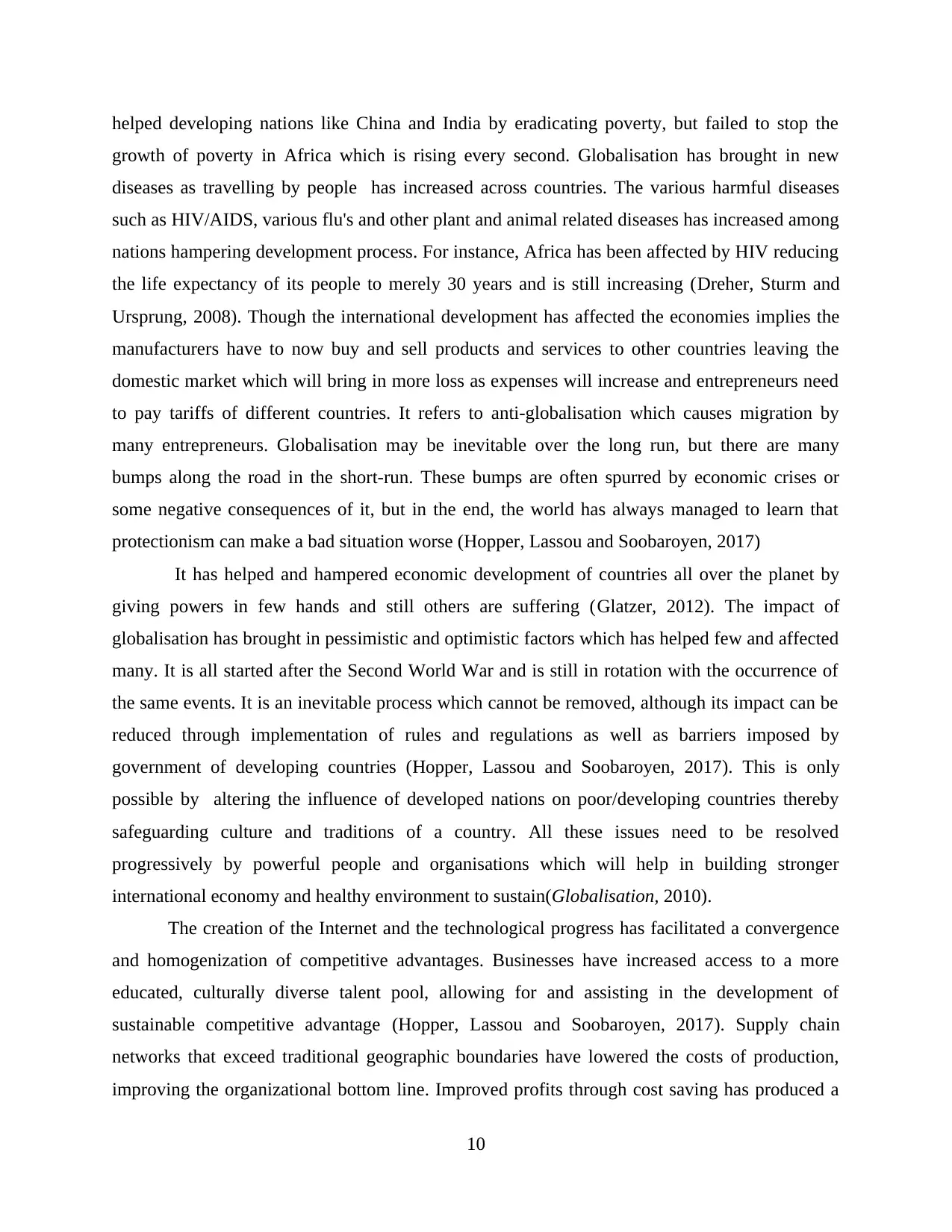
helped developing nations like China and India by eradicating poverty, but failed to stop the
growth of poverty in Africa which is rising every second. Globalisation has brought in new
diseases as travelling by people has increased across countries. The various harmful diseases
such as HIV/AIDS, various flu's and other plant and animal related diseases has increased among
nations hampering development process. For instance, Africa has been affected by HIV reducing
the life expectancy of its people to merely 30 years and is still increasing (Dreher, Sturm and
Ursprung, 2008). Though the international development has affected the economies implies the
manufacturers have to now buy and sell products and services to other countries leaving the
domestic market which will bring in more loss as expenses will increase and entrepreneurs need
to pay tariffs of different countries. It refers to anti-globalisation which causes migration by
many entrepreneurs. Globalisation may be inevitable over the long run, but there are many
bumps along the road in the short-run. These bumps are often spurred by economic crises or
some negative consequences of it, but in the end, the world has always managed to learn that
protectionism can make a bad situation worse (Hopper, Lassou and Soobaroyen, 2017)
It has helped and hampered economic development of countries all over the planet by
giving powers in few hands and still others are suffering (Glatzer, 2012). The impact of
globalisation has brought in pessimistic and optimistic factors which has helped few and affected
many. It is all started after the Second World War and is still in rotation with the occurrence of
the same events. It is an inevitable process which cannot be removed, although its impact can be
reduced through implementation of rules and regulations as well as barriers imposed by
government of developing countries (Hopper, Lassou and Soobaroyen, 2017). This is only
possible by altering the influence of developed nations on poor/developing countries thereby
safeguarding culture and traditions of a country. All these issues need to be resolved
progressively by powerful people and organisations which will help in building stronger
international economy and healthy environment to sustain(Globalisation, 2010).
The creation of the Internet and the technological progress has facilitated a convergence
and homogenization of competitive advantages. Businesses have increased access to a more
educated, culturally diverse talent pool, allowing for and assisting in the development of
sustainable competitive advantage (Hopper, Lassou and Soobaroyen, 2017). Supply chain
networks that exceed traditional geographic boundaries have lowered the costs of production,
improving the organizational bottom line. Improved profits through cost saving has produced a
10
growth of poverty in Africa which is rising every second. Globalisation has brought in new
diseases as travelling by people has increased across countries. The various harmful diseases
such as HIV/AIDS, various flu's and other plant and animal related diseases has increased among
nations hampering development process. For instance, Africa has been affected by HIV reducing
the life expectancy of its people to merely 30 years and is still increasing (Dreher, Sturm and
Ursprung, 2008). Though the international development has affected the economies implies the
manufacturers have to now buy and sell products and services to other countries leaving the
domestic market which will bring in more loss as expenses will increase and entrepreneurs need
to pay tariffs of different countries. It refers to anti-globalisation which causes migration by
many entrepreneurs. Globalisation may be inevitable over the long run, but there are many
bumps along the road in the short-run. These bumps are often spurred by economic crises or
some negative consequences of it, but in the end, the world has always managed to learn that
protectionism can make a bad situation worse (Hopper, Lassou and Soobaroyen, 2017)
It has helped and hampered economic development of countries all over the planet by
giving powers in few hands and still others are suffering (Glatzer, 2012). The impact of
globalisation has brought in pessimistic and optimistic factors which has helped few and affected
many. It is all started after the Second World War and is still in rotation with the occurrence of
the same events. It is an inevitable process which cannot be removed, although its impact can be
reduced through implementation of rules and regulations as well as barriers imposed by
government of developing countries (Hopper, Lassou and Soobaroyen, 2017). This is only
possible by altering the influence of developed nations on poor/developing countries thereby
safeguarding culture and traditions of a country. All these issues need to be resolved
progressively by powerful people and organisations which will help in building stronger
international economy and healthy environment to sustain(Globalisation, 2010).
The creation of the Internet and the technological progress has facilitated a convergence
and homogenization of competitive advantages. Businesses have increased access to a more
educated, culturally diverse talent pool, allowing for and assisting in the development of
sustainable competitive advantage (Hopper, Lassou and Soobaroyen, 2017). Supply chain
networks that exceed traditional geographic boundaries have lowered the costs of production,
improving the organizational bottom line. Improved profits through cost saving has produced a
10
Paraphrase This Document
Need a fresh take? Get an instant paraphrase of this document with our AI Paraphraser
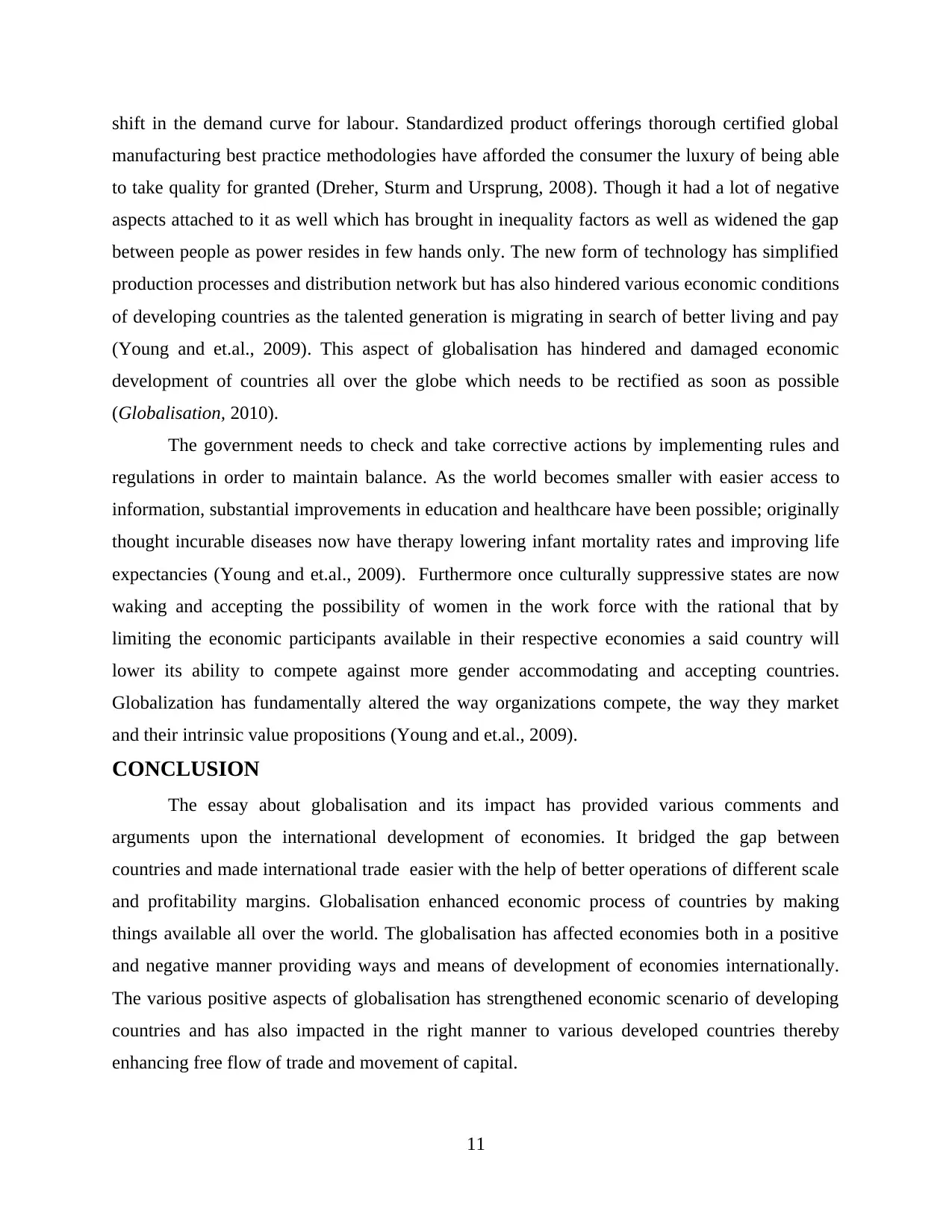
shift in the demand curve for labour. Standardized product offerings thorough certified global
manufacturing best practice methodologies have afforded the consumer the luxury of being able
to take quality for granted (Dreher, Sturm and Ursprung, 2008). Though it had a lot of negative
aspects attached to it as well which has brought in inequality factors as well as widened the gap
between people as power resides in few hands only. The new form of technology has simplified
production processes and distribution network but has also hindered various economic conditions
of developing countries as the talented generation is migrating in search of better living and pay
(Young and et.al., 2009). This aspect of globalisation has hindered and damaged economic
development of countries all over the globe which needs to be rectified as soon as possible
(Globalisation, 2010).
The government needs to check and take corrective actions by implementing rules and
regulations in order to maintain balance. As the world becomes smaller with easier access to
information, substantial improvements in education and healthcare have been possible; originally
thought incurable diseases now have therapy lowering infant mortality rates and improving life
expectancies (Young and et.al., 2009). Furthermore once culturally suppressive states are now
waking and accepting the possibility of women in the work force with the rational that by
limiting the economic participants available in their respective economies a said country will
lower its ability to compete against more gender accommodating and accepting countries.
Globalization has fundamentally altered the way organizations compete, the way they market
and their intrinsic value propositions (Young and et.al., 2009).
CONCLUSION
The essay about globalisation and its impact has provided various comments and
arguments upon the international development of economies. It bridged the gap between
countries and made international trade easier with the help of better operations of different scale
and profitability margins. Globalisation enhanced economic process of countries by making
things available all over the world. The globalisation has affected economies both in a positive
and negative manner providing ways and means of development of economies internationally.
The various positive aspects of globalisation has strengthened economic scenario of developing
countries and has also impacted in the right manner to various developed countries thereby
enhancing free flow of trade and movement of capital.
11
manufacturing best practice methodologies have afforded the consumer the luxury of being able
to take quality for granted (Dreher, Sturm and Ursprung, 2008). Though it had a lot of negative
aspects attached to it as well which has brought in inequality factors as well as widened the gap
between people as power resides in few hands only. The new form of technology has simplified
production processes and distribution network but has also hindered various economic conditions
of developing countries as the talented generation is migrating in search of better living and pay
(Young and et.al., 2009). This aspect of globalisation has hindered and damaged economic
development of countries all over the globe which needs to be rectified as soon as possible
(Globalisation, 2010).
The government needs to check and take corrective actions by implementing rules and
regulations in order to maintain balance. As the world becomes smaller with easier access to
information, substantial improvements in education and healthcare have been possible; originally
thought incurable diseases now have therapy lowering infant mortality rates and improving life
expectancies (Young and et.al., 2009). Furthermore once culturally suppressive states are now
waking and accepting the possibility of women in the work force with the rational that by
limiting the economic participants available in their respective economies a said country will
lower its ability to compete against more gender accommodating and accepting countries.
Globalization has fundamentally altered the way organizations compete, the way they market
and their intrinsic value propositions (Young and et.al., 2009).
CONCLUSION
The essay about globalisation and its impact has provided various comments and
arguments upon the international development of economies. It bridged the gap between
countries and made international trade easier with the help of better operations of different scale
and profitability margins. Globalisation enhanced economic process of countries by making
things available all over the world. The globalisation has affected economies both in a positive
and negative manner providing ways and means of development of economies internationally.
The various positive aspects of globalisation has strengthened economic scenario of developing
countries and has also impacted in the right manner to various developed countries thereby
enhancing free flow of trade and movement of capital.
11

12
⊘ This is a preview!⊘
Do you want full access?
Subscribe today to unlock all pages.

Trusted by 1+ million students worldwide
1 out of 14
Related Documents
Your All-in-One AI-Powered Toolkit for Academic Success.
+13062052269
info@desklib.com
Available 24*7 on WhatsApp / Email
![[object Object]](/_next/static/media/star-bottom.7253800d.svg)
Unlock your academic potential
Copyright © 2020–2026 A2Z Services. All Rights Reserved. Developed and managed by ZUCOL.





